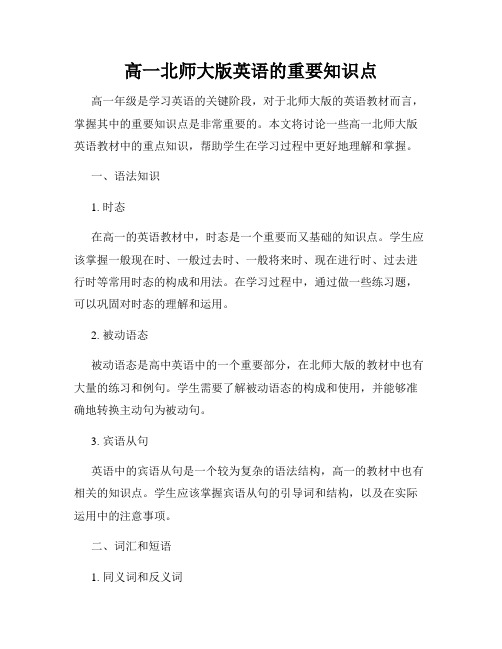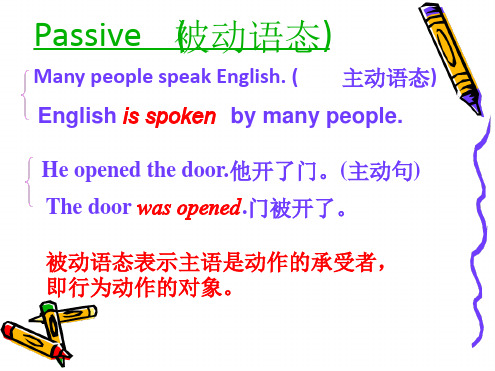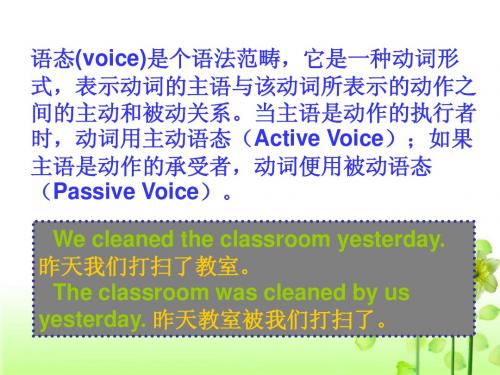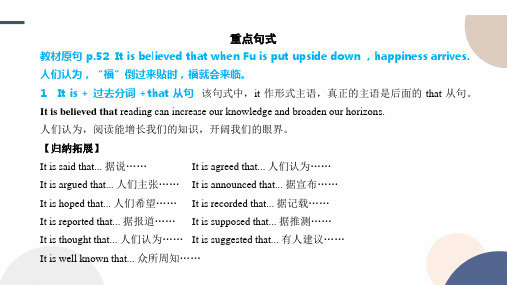北师大高一英语被动语态语法
北师大版高一英语语法(必修一-必修

北师大版高一英语语法(必修一-必修四)必修一一、一般现在时和现在进行时1,一般现在时e:反复进行的,经常性的动作(惯例或习惯)Eg, He watches soap operas.及状态I live in Beijing.一般现在时常和下列时间状语连用:always, usually, from, time to time, twice a week, rarely,seldom, once a month, never.2,现在进行时:说话时正在进行的动作(现在,此刻)一定时间段内经常进行的动作和现在进行时连用的时间状语有just, now, at the moment, at present.二、一般将来时:将来的安排和打算1、be going to表示打算要做的事情。
2、现在进行时表示已经确定或安排好事情。
Eg,I’m getting married in June.3、一般现在是表示不可改变的官方活动或时间表The summer term begins on the 15thofFebruary.三、一般过去时和过去进行时1,一般过去时:表示过去完成的动作或过去的情境和习惯。
Eg: She climb the stairs and went to her room.用一般过去时要在规则动词词尾加-ed,或用不规则动词的过去式,一般过去式的疑问句和否定句用did和didn’t加动词原形。
2、过去进行时:过去某段时间正在进行的动作形成某些事件发生的情境动作。
Eg, It was raining during the whole match.当过去进行时和一般过去时出现在同一个句子中时,过去进行时描述故事发生的背景,儿一般过去时则报道该事件。
Eg,We driving along a country lane when, suddenly a car drove past us.Form:过去进行时的结构是:主语+was /were +动词-ing形式。
高一北师大版英语的重要知识点

高一北师大版英语的重要知识点高一年级是学习英语的关键阶段,对于北师大版的英语教材而言,掌握其中的重要知识点是非常重要的。
本文将讨论一些高一北师大版英语教材中的重点知识,帮助学生在学习过程中更好地理解和掌握。
一、语法知识1. 时态在高一的英语教材中,时态是一个重要而又基础的知识点。
学生应该掌握一般现在时、一般过去时、一般将来时、现在进行时、过去进行时等常用时态的构成和用法。
在学习过程中,通过做一些练习题,可以巩固对时态的理解和运用。
2. 被动语态被动语态是高中英语中的一个重要部分,在北师大版的教材中也有大量的练习和例句。
学生需要了解被动语态的构成和使用,并能够准确地转换主动句为被动句。
3. 宾语从句英语中的宾语从句是一个较为复杂的语法结构,高一的教材中也有相关的知识点。
学生应该掌握宾语从句的引导词和结构,以及在实际运用中的注意事项。
二、词汇和短语1. 同义词和反义词在高一的英语学习中,学生应该多多积累同义词和反义词。
这有助于丰富词汇量和理解能力。
通过查阅词典、做练习题等方式,学生能够提升对同义词和反义词的记忆和应用能力。
2. 习惯用语和短语习惯用语和短语在英语表达中占据重要位置。
高一的教材中,也有不少例句和对话涉及到习惯用语和短语的使用。
学生应该学习并能够熟练运用这些习惯用语和短语,以提高口语表达和写作能力。
三、阅读理解1. 阅读技巧高一英语教材中的阅读理解部分考查学生的阅读能力和理解能力。
学生应该掌握一些阅读技巧,例如先读题再读文章、快速浏览文章找出重点等。
通过练习和积累经验,学生能够提高阅读理解的准确性和速度。
2. 阅读理解题型高一的英语教材中,阅读理解题型多种多样。
例如选择题、填空题、判断正误题等。
学生需要熟悉各种题型的要求和答题技巧,以便在考试中能够做到心中有数,得心应手。
总结:高一北师大版英语的重要知识点主要包括语法知识、词汇和短语以及阅读理解。
这些知识点是英语学习的基础,学生需要通过练习和阅读来不断强化和巩固。
高中英语北师大版高一上册《高考英语被动语态》课件

(五)语态转换时要注意的问题
1. 把主动语态变为被动语态时,其谓语动词的时态要与原句时态保 持一致,其谓语动词的数要与新主语保持一致。
We have bought a new computer. A new computer has been bought. (正确) A new computer have been bought. (错误) 2. 含有双宾语的主动句变被动句时,可分别将其中的一个宾语变为 主语,另一个不动,一样变间接宾语为主语时比较多。 My uncle gave me a present on my birthday. I was given a present on my birthday. 保存宾语 如果把直接宾语(指物)改为主语,则在间接宾语(指人)前加适当 的介词,如上句还可以说: A present was given to me yesterday.
5. 有些动词既是及物又是不及物,当它们和well, badly, easily等副词连用时,表示主语 内在品质或性能,是不及物动词,用主动表示被动,这时不用被动语态,常见的有: write, read, clean, sell, wash, cook 等。如:
The cloth washes easily. 这布很好洗。 The new product sells well. 这新产品很畅销。 The pen writes smoothly. 这支笔写字很流畅。 对照: The books sell well. (主动句) The books were sold out. (被动句) The meat didn’t cook well. (主动句) The meat was cooked for a long time over low heat. (被动句)
高一英语被动语态北师大版

Homework
改主动为被动句:
? Millions of Chinese people celebrate the Mid-Autumn Festival every autumn.
? dozens of boys light lanterns to celebrate the Lantern Festival.
(2)把谓语变成被动结构 (be+过去分词 ) (根据被动语态句子里的主语的人称和数,以及原 来主动语态句子中动词的时态来决定 be的形式)。 The man killed a tiger. → A tiger was killed by the man .(改的过程 中要注意时态和语态两个方面 ) .
Passive 被( 动语态)
Many people speak English. ( 主动语态) English is spoken by many people.
He opened the door.他开了门。(主动句) The door was opened.门被开了。
被动语态表示主语是动作的承受者, 即行为动作的对象。
三、 被动语态的各种句型:
The song is liked by young people. ( 肯定句) 否定句 :
The song isn ' t liked by young people 一般疑问句 :
Is the song liked by young people ? 特殊疑问句 :
2. is splashed 5. is related 8. are launched
3. are carried 6. are washed
Ex. 9 1. deed
2. was lit 5. celebrate 8. including
高中英语北师大必修一第三单元被动语态课件

The machine runs well. This pen writes quite smoothly. The bookshelf hardly sells. 三、表示主语状态特征的连系动词:look, feel, smell, taste, sound, prove, appear, seem等。例如: —Do you like the material? —Yes, it ________ very soft. C A. is feeling B. felt C. feels D. is felt Your idea sounds reasonable. What he said proved to be correct.
1. He made me do the work. I was made to do the work by him. 口诀3:这些动词真奇怪,主动句中to 离开,被动 句中to回 来。(feel,listen to,hear,let have,make,look at,see,watch…)
2.They take good care of the baby. The baby is taken good care of by them. 注意:含动词词组的被动语态,须 将其看作一个整体,不可把它们分 隔开来。
语态(voice)是个语法范畴,它是一种动词形 式,表示动词的主语与该动词所表示的动作之 间的主动和被动关系。当主语是动作的执行者 时,动词用主动语态(Active Voice);如果 主语是动作的承受者,动词便用被动语态 (Passive Voice)。 We cleaned the classroom yesterday. 昨天我们打扫了教室。 The classroom was cleaned by us yesterday. 昨天教室被我们打扫了。
Unit3 Lesson1 被动语态和句型 课件 高中英语北师大版必修第一册

It is well known that... 众所周知……
【学法点拨】 “It is + 过去分词 + that 从句”可以转换为“Sb/Sth+be+ 过去分词 +不定式”和“People+ 动词 +that...”。 It is said that they have won the game. = They are said to have won the game. = People say that they have won the game. 据说他们赢得了比赛。
would/should be done
单句语法填空 (1)Our classroom is cleaned (clean) every day. (2)The classroom was cleaned (clean) by us last night. (3) The classroom will be cleaned (clean) the day after tomorrow. (4) The classroom is being cleaned (clean)by three of our classmates at the moment. (5)So far,the classroom has been cleaned (clean). (6)When we got to the classroom, the classroom had been cleaned/was being cleaned(clean). (7) Our teacher told us that the classroom would be cleaned (clean) the next day.
北师大版高一英语必修1_Unit3_被动语态详解课件
Read the following sentences and then find other sentences with the same structures in the 3 passages.
1 Every year in September or October, the Mid-Autumn Festival is celebrated by the Chinese people all over the world.
The office is being cleaned. The shirts have been ironed. The window has been broken.
The roof is being repaired. The car has been damaged.
The houses are being knocked down. The trees have been cut down. They have been invited to a party.
现在进行时 am/is/are being done
一般过去时 was/were +done
过去进行时 was/were being done
3.was/were being done
When I got to the party,
the party/prepare the hall/decorate the foods/serve
① The party __w_a_s_b_e_i_n_g_p__re_p_a_r_e_d_.____
② The hall _w_a_s__b_e_in_g__d_e_c_o_r_a_te_d_._____
高中英语复习北师大版《被动语态 》 课件 (共21页)
METHOD
VERBS WITH ONLY ONE OBJECT
① She does her homework at school.
﹋﹋﹋﹋﹋﹋﹋﹋﹋
Her homework is done (by her) at ﹋﹋﹋﹋﹋﹋﹋﹋﹋﹋ school.( by phrase is usually omitted ) ② Where do people grow cotton in China?
• ② Mr Cheng teaches us math this term. • We are taught math this term. • ③My sister bought me a jacket last week. • A jacket was bought for me last week
3. When we want to emphasis the person or thing that is affected by the action:
I was given ten minu accept the offer.
Structure & Tense
DOG
&
EAT
FOOD
The dog has eaten our food.
Performer Active form (subject) Object
Our food has been eaten by the dog.
Subject
Passive form
SITUATIONS
1. When we do not know who or what the performer is: My bike was stolen last night. 2. When the performer is not so important: The flowers have been watered and you can go home now.
Unit 3 被动语态 The Passive课件2922-2023学年高中英语北师大版必修第一册
② It is well known that China is a great country with a long history.
6. 注意区别被动语态与系表结构: 被动语态表示动作,句子主语是该动作的承 受者,V-ed表示动作;而系表结构表示状态, 说明主语的特点或所处的状态。
Passive English is spoken by many people.
动作接受者 动作
动作执行者
We use the passive in the following cases:
Situation 1: We don't know or don't need to know who performed the action (不知道也不 需要知道谁做的这件事):
① It sounds good. (T) ② It is sounded good. ( F)
3. 有些动词常跟相关副词连用,以主动形式表 被动含义: lock (锁), wash (洗), sell (卖), read (读), wear (穿), blame (责备), ride (乘坐), write (写) ...
1. 不及物动词或动词短语无被动语态(即多数 的瞬间动词): appear, die, disappear, end, fail, happen, last, lie, remain, sit, spread, stand, take place, break out, come out, come about ...
miles away. 4. 昨天,乔治被选为班长而非亨利。
高一英语北师大版上学期Celebration重点语法解读
高一英语北师大版上学期Celebration重点
语法解读
被动语态
基本用法
1. 被动语态的概念
语态也是动词的一种形式,表示主语与谓语之间的关系。
英语有两种语态:主动语态和被动语态。
主动语态表示主语是谓语动作的执行者~如:People grew rice in this area some years ago.
被动语态表示主语是谓语动作的承受者,如:A new swimming pool will be built on our school.
具体内容点击进入了解:高一英语被动语态语法知识点情态动词:have to,should,can及ought to
基本用法 have to
have to 是一个比较特殊的情态习语,虽然也具有情态动词的功能,但却与其他的情态动词不同。
它有人称、数和时态的变化,其否定式和疑问式的构成方式也与情态动词不一样。
在使用have to 时必须弄清它的真面目,否则容易出错。
具体内容点击进入了解:高一年级英语语法情态动词的用法
相信大家已经掌握了高一英语北师大版上学期Celebration重点语法的内容,那么单词和句型也是不可或缺的,希望大家可以更好的学习高中英语北师大版必修一Celebration重点单词和北师大版高一英语上册Celebration重点句型,更多高一英语知识点请大家持续关注高中频道更新的内容,我们会在第一时间为大家发布最新消息。
- 1、下载文档前请自行甄别文档内容的完整性,平台不提供额外的编辑、内容补充、找答案等附加服务。
- 2、"仅部分预览"的文档,不可在线预览部分如存在完整性等问题,可反馈申请退款(可完整预览的文档不适用该条件!)。
- 3、如文档侵犯您的权益,请联系客服反馈,我们会尽快为您处理(人工客服工作时间:9:00-18:30)。
Grammar 被动语态1.被动语态常用时态的形式1)主要体现在be的变化上,其形式与系动词be的变化形式完全一样。
现列表如下:一般现在时:am / is / are +done一般过去时:was / were +done一般将来时:shall / will +be+done过去将来时:should / would +be+ done现在进行时:am / is / are + being + done过去进行时:was / were + being + done现在完成时:have / has + been + done过去完成时:had + been + doneeg. 1) His clothes are washed every week.2) My bike was repaired yesterday.3) The question ________________ at our next meeting. 这个问题将在下次会议上讨论。
4) John said he ________________________ unless he finished his homework in time.John 说如果他不能按时完成作业,他将会被惩罚。
5) The car __________________ (by the driver) now. 那辆车正在被修理。
6) Mr. Zhang ____________________ in the hospital this time yesterday.昨天这个时候Mr. Zhang在接受手术。
7) Everything ___________ to make the work easier. 所有的事情都做了来让工作更容易。
8) The secretary said that the report had been prepared.2) 情态动词的被动语态:情态动词+be+ doneeg. First aid is the science of giving medical care to a person before a doctor can be found.3) get + done 这种结构多用于口语中,后面一般不接by短语eg. To my surprise, he did not get hurt when he fell from the tree.4)短语动词的被动语态动词短语是一个不可分割的整体,在变被动语态时,不可丢掉构成短语动词的介词或副词eg. 1) The price has been brought down.2) A notice will be put up on the wall.2. 被动语态的用法:1)不确定谁是动作的执行者或没有必要之名动作的执行者。
1) Rice is grown in the south of the United States.2)需要强调或突出动作的承受着或事件本身。
如需要说出动作的执行者,用by短语。
1) Trees were being planted here this time last year.2) The cup was broken by Paul.3)在文章标题,广告,新闻中。
1) Girls wanted. 招聘女工2) Millions of pounds’ worth of damage has been caused by a storm which swept across the northof England last night. 昨晚一场横扫英国北部的暴风雨造成了几百万英镑的损失。
3. 主动形式表被动意义的情况:①某些感官动词和系动词加形容词可以表示被动意义,如look,smell,taste,feel,prove, wear,sound等。
eg. 1)The flower smells sweet.花闻起来很香。
2)The dish tastes delicious.菜吃起来非常可口。
3)The cloth feels very soft.这种布摸着很柔软。
②某些及物动词后加副词也可以表示被动意义,如wash,write,sell,read,open,cut,clean, tear等。
eg.1)This type of record sells well.这种型号的录音机销路很好。
2)That kind of shirt washes very well.这种衬衫很经洗。
3)Nylon dries quickly.尼龙织物干得快。
③want,need,require 和be worth等词的后面可以用动名词的主动形式表示被动意义。
eg.1)The book is worth reading.这本书值得一读。
2)The coat requires mending.大衣需要补了。
→The coat requires to be mended.3)My hair wants cutting.我的头发该剪了。
→My hair wants to be cut.4)The children need looking after.孩子们需要照看。
→The children need to be looked after.④某些作表语的形容词后(difficult, easy, interesting, pleasant, fit, important, heavy等),用不定式主动形式表示被动意义。
eg.1) The fish is not fit to eat.这种鱼不适于食用。
2) This kind of man is hard to work with.这种人很难共事。
3) The passage is difficult to read.这篇文章很难读懂。
⑤介词in, on, under等+名词构成的介词短语表示被动意义。
eg. 1) The house facing the lake is in the possession of Jim.→The house facing the lake is possessed by Jim.2) A lot of shoes are on show. →A lot of shoes are being shown Exercises:1. You can see the house ____ for years.A. isn't paintedB. hasn't painted C, hasn't been painted D. hadn't painted2. In some parts of the world, tea with milk and sugar.A. is servingB. is servedC. servesD. served3. This film is really worth ______. A.seeing B. to see C. see D. be seen4. She ____ for what she has done.A. ought to praiseB. ought to praisedC. ought be praisedD. ought to be praised.5. That book is difficult _______.A. to be understandB. to be understandingC. to have been understoodD. to understand6. His new book ____ next month.A. will be publishedB. is publishingC. is being publishedD. has been published7. Can such a thing _______ happening again?A. prevent fromB. prevented fromC. be prevented fromD. to prevent from8. The police found that the house ______ and a lot of things ______.A. has broken into ; has been stolenB. had broken into; had been stolenC.has been broken into; stolenD. had been broken into; stolen9. The question is easy _________.A. to answerB. to be answeredC. to be answeringD. to have answered10. ---- Have you moved into the new house? ---- Not yet. The rooms ________.A.are being paintedB. are paintingC. are paintedD. are being painting11. If city noises _______ from increasing, people ______ shout to be heard even at thedinner table.A. are not kept; will have toB. are not kept ; have toC. do not keep; will have toD. do not keep ; have to12. I need one more stamp before my collection________.A.had completedB. completesC. has completedD. is completed13. The boy deserves _______for what he did.A. punishingB. punishedC. be punishedD. to punish14. ----______ the sports meet might be put off. -----Yes, it all depends on the weather.A. I’ve been toldB. I’ve toldC. I’m toldD. I told15. The maths problem _______ among the students soon.A. is about to be discussB. is going to be discussedC. is to discussD. is to be discuss16. ---- Harry ! You ______ on the phone. -----Oh, _______. Thank you.A. are wanted ; I comeB. are wanted; I’m comingC. are being wanted ; I comeD. are being wanted; I’m coming17. My watch can’t work, it _________.A. need repairingB. needs repairingC. needs be repairedD. needs to repair18. My watch _____ while I was playing basketball.A. get breakingB. get brokeC. get brokenD. breaking19. I feel it is your husband who _______for the spoiled child.A. is to blameB. is going to blameC. is to be blamedD. should blame20. We didn’t expect our offer _________ so quickly.A. to be rejectedB. to rejectC. rejectingD. rejected21. The new books are of great use. They _________ well and __________ already.A. sell; have been sold outB. sold; had sold outC. sell; sell outD. sold; have sold out22. ----Do you like the material? ----- Yes, it _______ very soft.A. is feelingB. is feltC. feltD. feels23. Have you any homework _________ this evening?A. to be doneB. to doC. doingD. done24. The child needs ________ to school and _________.A. to go; to educateB. going; to educateC. to go; educatingD. going; educating25. ----Why was Tom put into prison? ----- Because he had been caught________.A. to stealB. stoleC. stealingD. steal26. He will stop showing off, if no notice _______ to him.A. takesB. has takenC. is takenD. will take自助餐:On their wedding (婚礼) day, a young Japanese farmer decided to give his wife a present. The present was a mirror, and it made his wife very 16 because she’d never seen her reflection (映像) before 17 in the waters of a pond or stream. When she looked in the mirror and saw her lovely 18, the young woman laughed with 19. The farmer was joyful, too. He knew he was lucky to have such a beautiful 20.After a few years, the young wife gave birth to a baby girl. But the birth was 21 and the young woman died. The farmer felt 22 sad that he put all of his wife’s things 23 in a box, including (包括) her 24 mirror.The mirror 25 in the box for many years.The daughter 26, and with each year she 27 more and more like her mother. One day, her father took her to a quiet garden and 28 her about her mother and the mirror she so loved. The girl was so 29 what her father said that she could not contain (克制) herself. She dug into (找出) her mother’s old things and 30 the mirror. She 31 the mirror in front of her face and looked 32 into it: “Father, father, come here,” she 33 . “It is mother. Her face is in the mirror.” The face in the mirror was the girl’s face, 34 herfather didn’t say a word. He could not 35. T ears were streaming down his face.16. A. scared B. proud C. happy D. sad17. A. near B. except C. between D. from18. A. picture B. face C. hands D. legs19. A. kindness B. excitement C. joy D. confidence20. A. decision B. present C. mirror D. wife21. A. difficult B. long C. wonderful D. usual22. A. very B. so C. rather D. such23. A. up B. away C. down D. off24. A. favourite B. new C. strange D. broken25. A. put B. held C. lay D. kept26. A. thought B. studied C. worked D. grew27. A. acted B. looked C. laughed D. sounded28. A. told B. asked C. begged D. encouraged29. A. amazed at B. frightened by C. tired of D. interested in30. A. felt B. found C. cleaned D. watched31. A. lifted B. tried C. dropped D. shook32. A. carelessly B. clearly C. slowly D. deeply33. A. answered B. cried C. asked D. commented34. A. but B. and C. as D. since35. A. reply B. believe C. speak D. stand。
